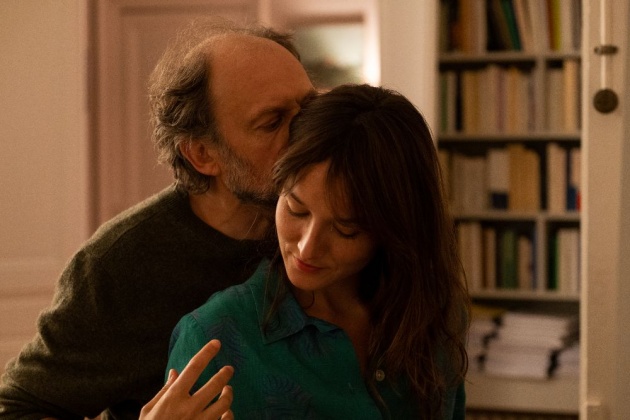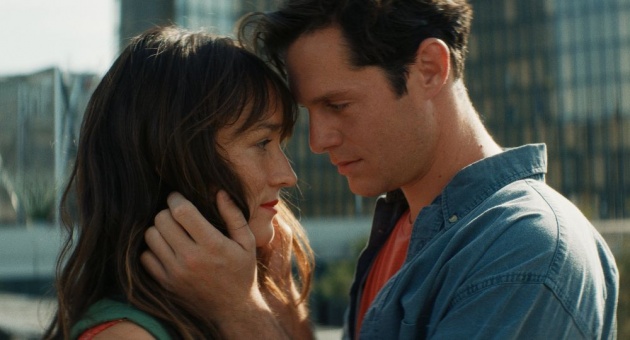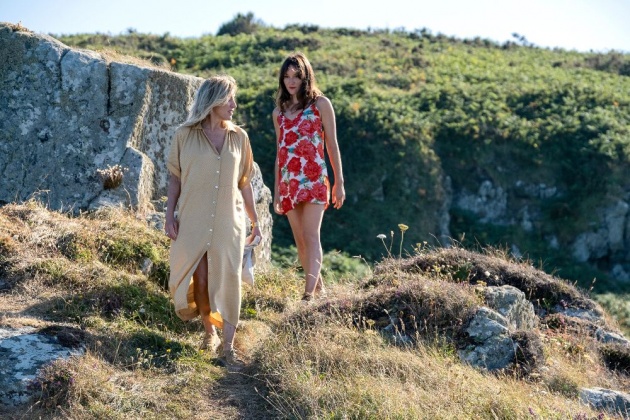
Pictured: 'Please may I satisfy my twelve year itch?' Daniel (Bruno Podalydès) and Anaïs (Anaïs Demoustier) in a scene from the French romantic comedy, 'Les Amours d’Anaïs', written and directed by Charline Bourgeois-Tacquet. Photo courtesy of Be for Films / Haut et Court Distribution / Semaine de la Critique (Cannes)
Anaïs (Anaïs Demoustier), the title character of writer-director Charline Bourgeois-Tacquet’s debut feature, Les Amours d’Anaïs (Anaïs in Love), is a whirlwind. When we first meet her, she is snatching a bunch of flowers then running down the street to head for her apartment. She has a claustrophobic fear of elevators (as revealed later on) so dashes up the stairs to let in her landlady, who scowls at her sceptically. Anaïs offers the woman some juice, but then finds that she doesn’t have any. She offers her some tea. The landlady refuses. Ostensibly, the landlady has come to install a smoke detector, one that has an adhesive back so you can attach it on the wall with ease. Anaïs does so. Halfway through the conversation, the smoke detector falls down. Anaïs jumps. We jump. She re-affixes it. Her landlady reminds her that Anaïs owes rent for March and April. Anaïs promises to pay. She wants to get someone to move in with her, though she has issues - as we discover, like not wanting a man to spend the night in her bed. Anaïs is halfway through her thesis. She will apply for welfare (or is waiting for payments to kick in). She has no visible source of income. As we discover, when she has the opportunity of paid work, things get in the way. She is always behind on her schedule. She remembers that she needs to get changed. The camera follows her into another room – her flat is poky, claustrophobic and filled with books – as she slips out of one dress and into another without so much as a shower, continuing the conversation all the while. We note that her underwear does not match. Grabbing her landlady’s wrist to look at her watch – a bit forward, but Anaïs has no filter - she discovers that it is 8:15pm. She is late for a party. ‘You can see yourself out,’ she tells her frankly astounded landlady, who is too dizzy to be stoked with offense.
Les Amours d’Anaïs is one of those bourgeois French films where, if you are not on board from the first scene, you’ll experience one hour and thirty-eight minutes of sheer tedium. Anaïs doesn’t slow down throughout most of the film’s length as if participating in a bedroom farce – and in some scenes, she is hiding or not taking calls. The best way to respond to Anaïs as one of the character’s discovers is to outpace her. Even then, if Anaïs wants something, she’ll take it.
I confess to having a slight wobble before I was drawn into Anaïs’ vortex. When we first see her running, I struggled to read her mood. Was she thinking about the person who was waiting for her, or the appointment after that or was she ashamed of being late, of being caught out by time? It definitely isn’t the latter – Anaïs isn’t ashamed of anything. She explains herself and expects her words to be enough. Once she started engaging with others, whilst at the same time, being preoccupied with the next thing, never being fully present, I was hooked. The film’s question: what will make Anaïs slow down?
Whilst not set in Paris, Bourgeois-Tacquet’s film is concerned with writers, academics and students, a world away from gilet jaunes, welfare reforms and Covid-19. It exists in a bubble which, right up until 2020, was quite relatable. Given current events in Eastern Europe (as of March 2022), pretty much every film is now a period piece, in a world that seems just as fantastic and removed from our own as Tatooine in the Star Wars films.
About that party. Anaïs arrives late. (When does she not?) Carrying her bouquet and her bicycle, she prevails upon strangers to take her up to the sixteen floor in the elevator. One group of men going to a different floor is indifferent to her. Daniel (Bruno Podalydès), a middle-aged academic carrying a bottle of wine, is not. He is going to the same party, hosted by friends of her brother’s. She explains her phobia and asks Daniel to take her bike, which he wheels into a vertical position, wheels against the wall, while she runs up the stairs. ‘But it is sixteen floors,’ remarks Daniel incredulously. Anaïs smiles. ‘I like hiking.’ Halfway up, she tweaks her knee. She continues and returns to Daniel (still incredulous) his bottle of wine. ‘Wait,’ she says, attending to her bouquet. She starts removing flowers that are wilting or a little sad. Daniel helps. Eventually she bins the whole bouquet.
At the party, she stretches her legs and pads around barefoot. She tells Daniel that she has aggravated an old injury and explains her situation. She has a boyfriend, is halfway through her thesis on 17th Century expressions of pleasure. Daniel explains that his wife is a writer. She is away at present; we know what that means. We discover that he has been married twice. He split up with his first wife after twelve years. He has been with his second for twelve years. There is a cycle. Meanwhile, we don’t see Anaïs interacting with the hosts, as if she is not fully present at the party either. Even when she arrives, she is never where she needs to be.
We meet the boyfriend, Raoul (Christophe Montenez) en plein air outside an entertainment complex. He is handsome, boring and irritated. Anaïs (of course) is twenty-five minutes late. The movie has started. ‘But there are adverts.’ ‘They only take twenty minutes.’ ‘A shame. I really wanted to see that movie.’ Anaïs tells him she is seven weeks pregnant – a detail not previously mentioned. ‘But I’ll get rid of it.’ She has an appointment with a family friend at a clinic. Raoul, flummoxed, astounded, still irritated, asks why she did not allow them to make the decision together. He wants a child; Anaïs does not. Her position is inflexible. Their relationship is at end.

Picture: 'We're late for the film. What do want to do instead?' 'I'm pregnant.' Anaïs (Anaïs Demoustier) and Raoul (Christophe Montenez) in a scene from the extremely likable French romantic comedy, 'Les Amours d’Anaïs', written and directed by Charline Bourgeois-Tacquet. Still courtesy of Be for Films / Haut et Court Distribution / Unifrance / Semaine de la Critique (Cannes)
Are we surprised to see Daniel making love to Anaïs in her tiny apartment? Or that he cannot climax? Of course not. He rolls onto his back. Anaïs explains that he has broken up with Raoul. She lights a candle. They talk and resume sex before they interrupted by the beeping of Anaïs’ smoke alarm. She attends to it whilst naked, asking Daniel to pass her a book which she uses to smash the alarm, silencing it. Having told her that she simply needed to press a button, Daniel observes, ‘you don’t do anything by half measures.’ Indeed, she does not. She asks him to leave because she cannot sleep with a man, meaning actually sleep, not have sex.
Anaïs visits her parents and joins her mother (Anne Canovas) on a sun lounger in the back garden. At last, Anaïs appears to be slowing down. They discuss a book by Sol Stein that Anaïs recommended but that failed to move her mother. ‘That’s OK,’ says Anaïs, ‘we don’t have to like the same books.’ Restless as ever, Anaïs goes inside the house to find a sunhat and then notices a series of letters. She is mortified. ‘You didn’t tell me you had a relapse.’ Anaïs’ mother has a liver condition. She requires surgery. How can her parents carry on cheerfully as if nothing is happening? Anaïs doesn’t realise it, but the answer is in herself, being in a state of permanent distraction, never being fully present. This makes Les Amours d’Anaïs a film for 2022; for to be fully present is to be terrified and numbed into a form of inertia.
Anaïs, of course, needs to do things. She visits the clinic to end her pregnancy, spending a brief moment with her family friend. She sublets her apartment to a young Korean couple, to whom she speaks (briefly) in English, before explaining the facilities in French, including advice not to use the oven - now there’s a ticking time bomb. She moves in with Daniel, but then moves out when he offers her his son’s bedroom to sleep in. ‘I thought you were committed to this relationship. I only want to be with a man who is all in.’ Having no place to stay, she visits her brother, Balthazar (Xavier Guelfi) who is minding a sick lemur, to whom he has administered Xanax. He asks Anaïs to help him move the lemur to the sofa and to watch him. The lemur belongs to his girlfriend. Anaïs is horrified. She calls on her thesis supervisor and gets a job as a personal assistant to an academic, who is attending a symposium. Speaking to her supervisor in the street, Anaïs is distracted (again). She sees Emilie (Valeria Bruni Tedeschi), Daniel’s wife, whose work she has come to admire and whom she sees as a soulmate. At this point, the film truly begins.
In a left-field development, Anaïs books herself into a five-day writing retreat attended by Emilie in order (ostensibly) to stalk her. She can’t afford the 350 Euro fee, that is, 70 Euros a night; her credit card is declined. The ‘handyman’ Yoann (Jean-Charles Clichet) – actually a writer himself - offers to help. Anaïs can do odd jobs as part-payment for her attendance. Her fee is now only 140 Euro. She reintroduces herself to Emilie, who asks, quite naturally, ‘what do you want?’ The unspoken answer is simple: her.
In order to sell this to an audience, Bourgeois-Tacquet had to make us understand Anaïs and fall in love with her – or at least admire her, a bit. Her behaviour doesn’t withstand 21st Century conventions of morality. Compelling characters are not always above reproach. They don’t have an easy means of course correction. Normally, in love stories, we fall in love with a character through another person’s eyes. However, Bourgeois-Tacquet shows us more of Anaïs than Emilie sees. Emilie is awestruck by this bold woman who (we sense) is unlike any she has ever seen. It is to the writer-director’s credit that the film’s conclusion feels earned.

Picture: Take a hike. Emilie (Valeria Bruni Tedeschi) and Anaïs (Anaïs Demoustier) in a scene from Les Amours d’Anaïs, a charming French romantic comedy written and directed by Charline Bourgeois-Tacquet. Still courtesy of Be for Films / Haut et Court Distribution / Unifrance / Semaine de la Critique (Cannes)
The second half becomes openly farcical, notably when Daniel turns up. (‘What – I can’t visit my wife?’ he tells Anaïs.) In one scene, Yoann invites Anaïs for a swim in which (obviously) he intends to seduce her. Anaïs then sees Emilie and invites her too. (There is a running joke about threesomes, but Anaïs does not want that.) While Emilie disappears to fetch her swimsuit, Anaïs makes a plea to Yoann to leave, so that she can have her chance with Emilie; her future depends upon it. Yoann is naturally convinced. Anaïs’ driving leaves a lot to be desired; she gives Emilie her phone to find her song and then talks about her mother, whom she has to call so as not to jinx her condition. Anaïs’ mother is surprised to hear from her. Anaïs and Emilie end up on the beach. There is sand on Anaïs’ leg. Feelings are expressed, then kisses, then more.
Bourgeois-Tacquet depicts Anaïs in a more convincing way than she does Emilie. When Emilie talks about writing in different forms – novel, essay and so on – she sounds banal. Emilie apparently couldn’t find a film about a woman writer to show her students – well, who remembers Julia (about Lillian Hellman) or Sylvia (about Sylvia Plath’s relationship with Ted Hughes) or Impromptu (about the writer George Sand, as played by Judy Davis) or An Angel at my Table (about Janet Frame)? My goodness, Emilie didn’t try very hard. Instead, she shows them John Cassavetes’ Opening Night about an actress, played the estimable Gena Rowlands. The Cassavetes reference seems off-target, though Anaïs is as unapologetic a protagonist as any played by Rowlands. However, Emilie loves Sol Stein and loses a paperback copy of one of Stein’s books and that’s all we need to know.
There is a coda. We are relieved to know that the lemur made a full recovery. Anaïs has dinner with Emilie. Emilie isn’t sure. Anaïs is. They get into an elevator, which is a big thing for Anaïs. Just before the elevator doors fully close, there is a slight pause, a chink of light. That pause is beautiful.
A viewer will decide what to think about this film within the first five minutes. Reader, it’s worth it.
Reviewed at Glasgow Film Festival, Tuesday 8 March 2022 (International Women’s Day), Glasgow Film Theatre Screen Three, 15:15 screening



